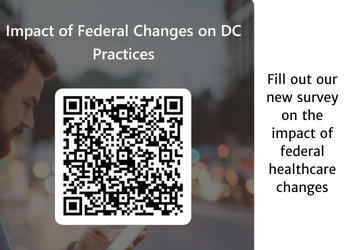News
MSDC and DC ACOG Submit Doula Payment Comments
On Friday, July 1, 2022, the Medical Society of DC and DC Chapter of the American College of Obstetricians and Gynecologists submitted joint comments to the Department of Health Care Finance (DHCF) on a proposal to reimburse doulas. The comment period was in response to work done by a DHCF task force designed to explore implementing legislation reimbursing doulas for maternal health services.
The comments - seen below - focused on the metrics for reimbursement. The two organizations are primarily concerned that the government may be reimbursing doulas simply for being present, even if their work is medically inefficient or counterproductive. This is in contrast to how medical providers are reimbursed, with a renewed emphasis on outcomes in care.
________________________________________________________________
The following comments are co-signed by the Medical Society of DC and the DC Section of the American College of Obstetricians and Gynecologists.
With over 3,100 members, the Medical Society of the District of Columbia (MSDC) is the largest medical organization representing metropolitan Washington physicians in the District of Columbia. The Medical Society, founded in 1817, is the leading voice of medicine and public health advocate on issues impacting the diverse population of our Nation’s Capital. MSDC is dedicated to ensuring the well-being of physicians and their patients in metropolitan Washington.
The American College of Obstetricians and Gynecologists (ACOG), with over 58,000 members nationally, maintains the highest standards of clinical practice and continuing education for our members. Locally, we represent approximately 225 DC OBGYNs in-training and in-practice who deliver at five birthing hospitals, providing obstetrical care to the majority of mothers/babies financed by DC Medicaid.
Our organizations applaud the Department of Health Care Finance for your proactive and public approach to this issue. We recognize that Doula services appear to be beneficial in several pilot studies. However, DC is adopting Doula care based on Doulas’ personal experiences without a recognized body of medical knowledge or standards of care. We are concerned about some of the ill-defined parts of the SPA amendment. Given the short timeframe for written comments, we are happy to expand our comments below outside of the formal comment period or in a meeting.
Regarding perinatal counseling and education, we note the amendment provides reimbursement for doula’s providing perinatal counseling and education. However, not included with this amendment is any indication for what the guidelines for counseling and education are. In a medical profession, there is a legal requirement for providers to give treatment and advice vetted by science and medicine. As doulas do not have medical training, the advice given for which they are reimbursed may be irrelevant, medically inaccurate, or harmful to the mother and baby. We recommend a further explanation of practice standards and defined credentialing and licensing under which adequate and appropriate counseling and education is eligible for reimbursement.
Postpartum, DHCF proposes reimbursement for emotional and physical support. Again, this is vague language without appropriate medical guidelines. We are concerned that the doula would receive reimbursement for unsupervised advice and consulting on matters for which they may not have adequate training or for which they disregard established medical knowledge. For example, a patient presenting with swollen legs to a medical provider’s office would receive an exam and based on medical training receive a diagnosis. A doula seeing the same patient could offer advice that may or may not be consistent with correct medical diagnosis. Swollen legs could be a normal result of pregnancy/ post-partum, or preeclampsia, a serious medical issue. If a doula recommends rest rather than seeking medical treatment, the doula could be reimbursed for advice that harms the patient. Furthermore, the amendment does not require coordinated care: doulas should report their interactions, findings, and recommendations to each patient’s Obstetrical team.
Relatedly, it is unclear how misdiagnosis liability is handled. If DHCF gives approval for funding counseling and advice, does that equate to providing medical advice? If there is an adverse health outcome, is the medical provider liable for the activities of the doula? Using the example above, would a medical provider be liable for adverse outcomes even though the doula gave incorrect advice? Medical providers are liable and responsible for their treatments and counseling, which gives legal protection to ensure the advice and treatment given is based on current medical and scientific knowledge and follows standard of care. A reimbursed doula does not have the same legal liability and thus may be less incentivized to follow science rather than instinct and personal belief.
We thank DHCF for undertaking this amendment and engaging the community. While we acknowledge pilot studies have suggested a benefit for at risk patients, potentially reducing maternal and neonatal morbidity, mortality AND the associated excess healthcare expenses. We also point out there are no defined standards for quality care nor number of Doula visits proven to provide these benefits. A doula may become a new and important member of the obstetrical care team. However, we are concerned that the lack of required care coordination and the open-ended reimbursement process may unintentionally equate their work with the work of scientifically educated medical providers and evidence-based standards of care.

